Jimmy Butler Does Not Want to Be Your Hero
Jimmy Butler was and is upset the Heat didn’t go into the bubble and do what they said they were going to do: win a championship.
Which meant Butler took it upon himself in the offseason to persuade point guard Goran Dragic, an unrestricted free agent, to return to Miami so they could make at least one more run together at a title. Butler was frustrated that the two didn’t get to display their collective talents during the Finals, when Dragic’s foot injury limited him to just 34 minutes. And the teammates had grown particularly close over the course of the longest season in league history.
So Butler pestered Dragic, a 12-year veteran, on FaceTime. Dragic was vacationing in his native Slovenia as he mulled his options. Butler wasn’t interested in hearing them. “He said, ‘You better sign with the Heat. If not, I know where you live. I’m going to hunt you down. And I’m going to beat you up,’ ” Dragic recalls with a chuckle.
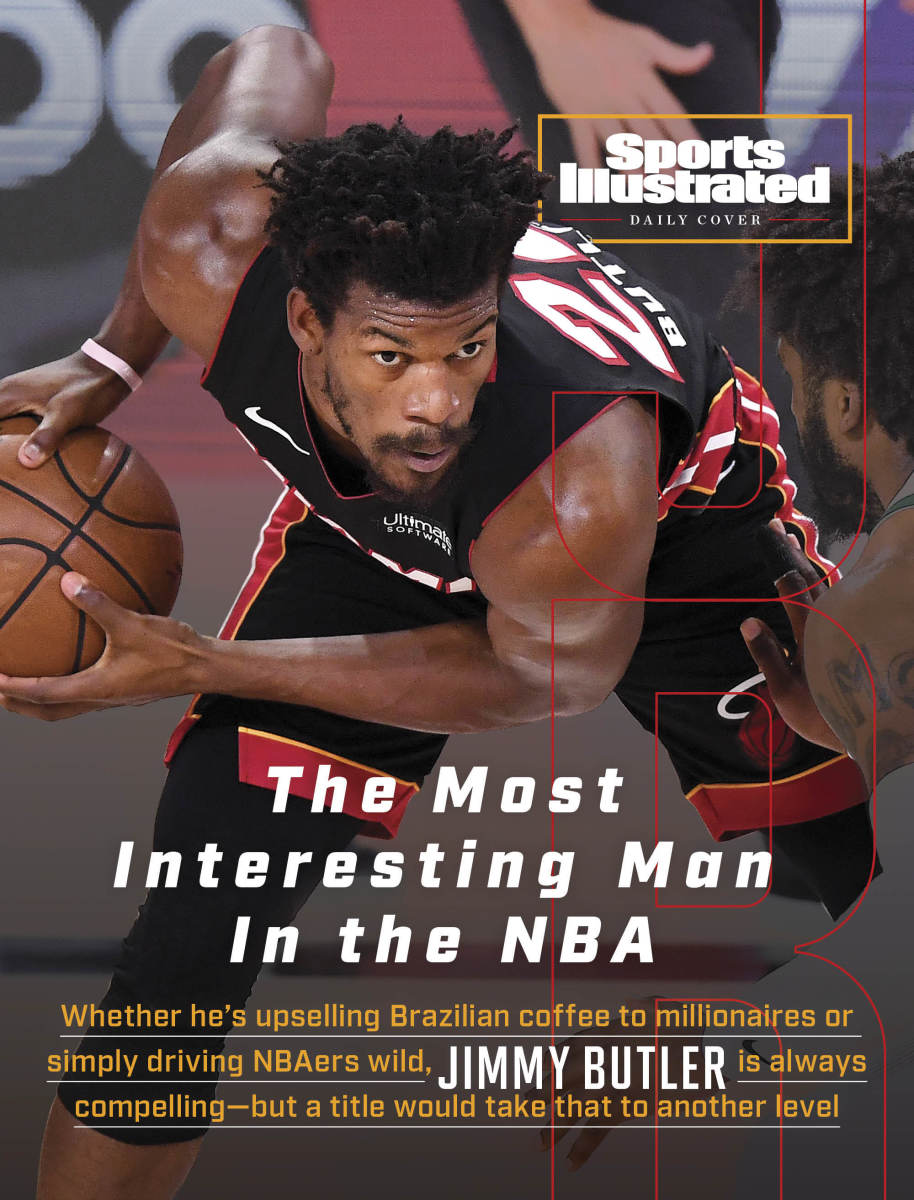
“I said, ‘G, we got to run this back, or I’m going to punch you in your head,’ ” Butler recalls with no hint of a smile.
One minute after the start of the NBA’s free-agency period on Nov. 20, Dragic announced he would be returning to the Heat on a two-year, $37.4 million deal.
After years of bouncing from team to team, leaving a wake of flustered teammates in his path, Jimmy Butler, the tough Texan from tiny Tomball, is now . . . endearing. The black hat is gone. As we talk over Zoom, I’m explaining to him how a story I wrote about how he won the bubble despite losing the Finals resonated with readers.
“No offense, but I haven’t read any article that you’ve written,” Butler, 31, told me last month. “I’m sure your work is absolutely f------ incredible, but I don’t pay attention to the media. One day they’re going to like you, the next day they heard this so they write a story about it. But don’t nobody know what’s really going on.”
What really goes on with Butler has been a constant source of fascination since he entered the league out of Marquette as the last first-round pick in 2011. The Bulls unloaded him in June ’17 after deciding he couldn’t be the leader of a championship team. He lasted a little more than a season in Minnesota, where he clashed with younger teammates, then one year in Philadelphia, where he clashed with his coach. Through all that, he missed the playoffs only once. When he joined the Heat through a four-team trade in the summer of 2019, Butler was still the trash-talking, supremely confident MF-dropper he was in his previous stops. The difference: He entered an environment that welcomed his brand of passion.
“I still don’t think Jimmy looks at himself as a good guy,” says Dwyane Wade, the Heat legend who spent a year with Butler in Chicago. “You won’t see a change in him. If you like him? Cool. If you don’t? Cool. Jimmy don’t give a f--- either way.”
The new marriage resulted in not only a surprising run by the fifth-seeded Heat to the Finals but also an iconic championship performance by Butler, albeit in a losing effort against the Lakers. The 6' 7", 230-pound forward averaged 26.2 points, 8.3 rebounds, 9.8 assists and 2.2 steals on 55.2% shooting over six games, logging 43.0 minutes per night, much of that time in an enervating effort to slow down the only person on the planet capable of putting up similar numbers, LeBron James.
Butler doesn’t describe himself as a hero; instead he considers himself someone with a sickness, an obsession about winning. The Finals loss still eats at him. (“Motherf-----, we were right there.”) And in Miami, from president Pat Riley down to the 15th man, he’s part of a group that’s as obsessed as he is.
In his first practice with the Heat, Butler was his usual abrasive self. No one was spared, not even Dragic. Everyone was taken aback by such competitiveness so early in training camp. But as opposed to his previous NBA teammates, Butler found his new ones were willing to push back.
Duncan Robinson, a swingman who had fewer than 200 minutes of NBA experience, was one of the first to go toe-to-toe with Butler. “I wouldn’t be surprised if he didn’t even know who I was then,” Robinson says. Once, the anonymous shooter took a handoff on the wing; when Butler went under the screen, Robinson hit a wide-open three. He not-so-politely advised Butler not to leave him open like that again. And it was just that sort of response that assured Butler he was finally in just the right environment.
“He had been all over SportsCenter because of how it had gone down in Minnesota, and on top of that his reputation preceded him,” Robinson says. “It was funny to realize it was now happening to us. What surprised me the most were his intentions. It wasn’t coming from a malicious place. It was coming from a place of, Let me see what we got here.”
It didn’t take Butler long to size up the Heat. He went nearly the whole season with a knowing smirk on his face. After about 30 games he began ending nearly every conversation with his teammates with “and we’re going to win a championship.” Whether it was a meeting, a film session after practice or a locker room discussion after a loss, Butler committed himself to instilling that belief in everyone around him. The Heat didn’t quite buy it at first, but his persistence paid off.
“He was so adamant about what was going to happen,” Robinson says. “It gets to the point where you hear it enough, you assume that mentality as well. You’re buying into the psyche he’s constantly perpetuating.”
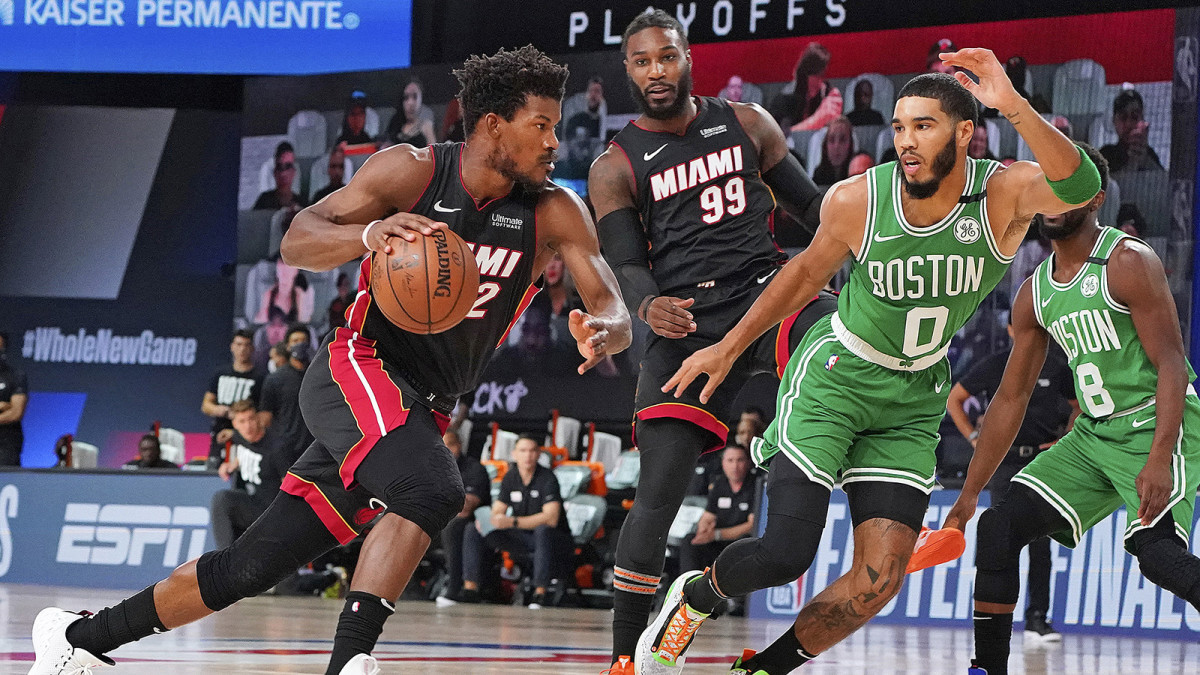
The Orlando bubble was practically built for someone as focused as Butler. Unlike most players, he chose not to bring his infant daughter, Rylee, her mother or any friends with him, to remain mindful of the job at hand. While the isolation was understandably difficult for many, the five-time All-Star relished it.
“I had a good time, man,” Butler says. “I learned a lot about myself. I had a lot of time to think, about basketball or life in general. And I picked up a lot of new hobbies.”
One of those was figuring out new ways to amuse his teammates—and himself. After rookie Tyler Herro scored 37 points in Game 4 of the Eastern Conference finals, Butler showed up to next practice wearing the 20-year-old’s high school jersey. After the Heat clinched a trip to the Finals, he rocked coach Erik Spoelstra’s No. 30 University of Portland jersey. While the playoffs brought out Butler’s intensity, it also let him tap into his lighter side. He was serious about the experience, but he wanted it to be fun for those around him. (Butler is also serious about his jersey collection; he won’t reveal how he received the threads, lest others copy him. But he does say he has more jerseys “in the chamber.”)
Another one of Butler’s pastimes was as the proprietor of Big Face Coffee, a hotel-room café Butler started seemingly with the sole purpose of upcharging his wealthy clientele. He had landed in Orlando with enough equipment to satisfy his own coffee needs but saw a business opportunity once he realized there wasn’t a reliable caffeine option on campus. The Big Face menu was surprisingly expansive—ranging from pour-overs to lattes to cappuccinos—for a pop-up operation. But each drink, no matter the size, cost $20.
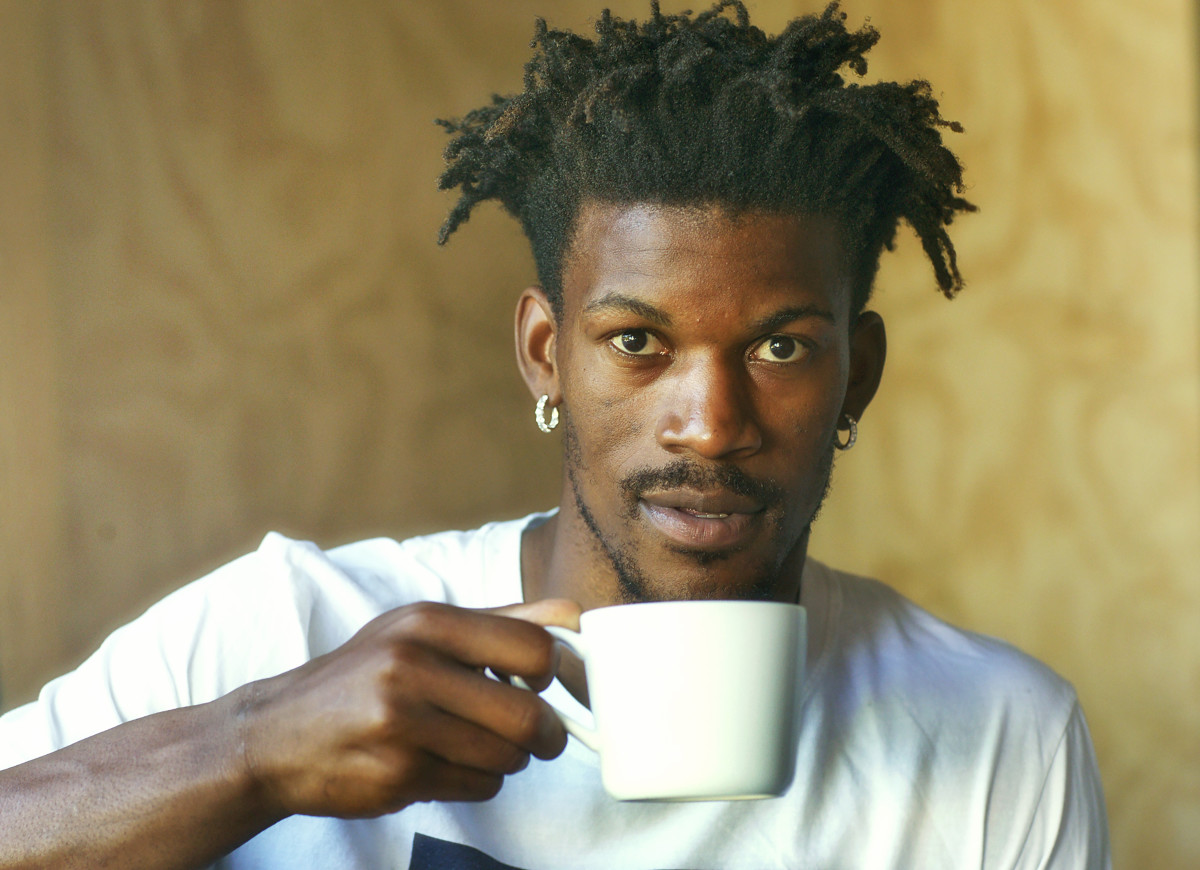
Butler used to be the kind of coffee drinker who would load up a run-of-the-mill cup with eight sugars. Then his trainer, James Scott, told him consuming higher-quality coffee in moderation could help with his training regimen. It wasn’t long before the endlessly curious Butler, on his travels to Europe, would spend hours in cafés, talking to patrons about how they take their coffee.
He became as obsessive about beans as basketball and now is an arguably more versatile barista than backcourt player. He owns a scale, a Chemex, an espresso maker—you name it. (“I wish I could take five years off and open a café.”) His preferred cup is a black pour-over. His preferred origin of bean is Brazil. He roasts and grinds everything himself. And one of his biggest offseason projects was practicing his latte art, which still needs some work before it reaches the Big Face menu. (“You have to pour it from a certain height and certain angle. It’s taken up a lot of time, and a lot of mistakes.”) Scott says while it’s easy for Butler to gouge NBA millionaires when he has no competition, his concoctions are worth the price because of the attention that goes into each cup.
“That’s the part of Jimmy nobody knows,” Spoelstra says. “That guy in the Dos Equis commercial? Jimmy’s like a version of that guy. He’s literally one of the most interesting people in the NBA fraternity. If you talk about anything, he’s like, I’ve done that.”
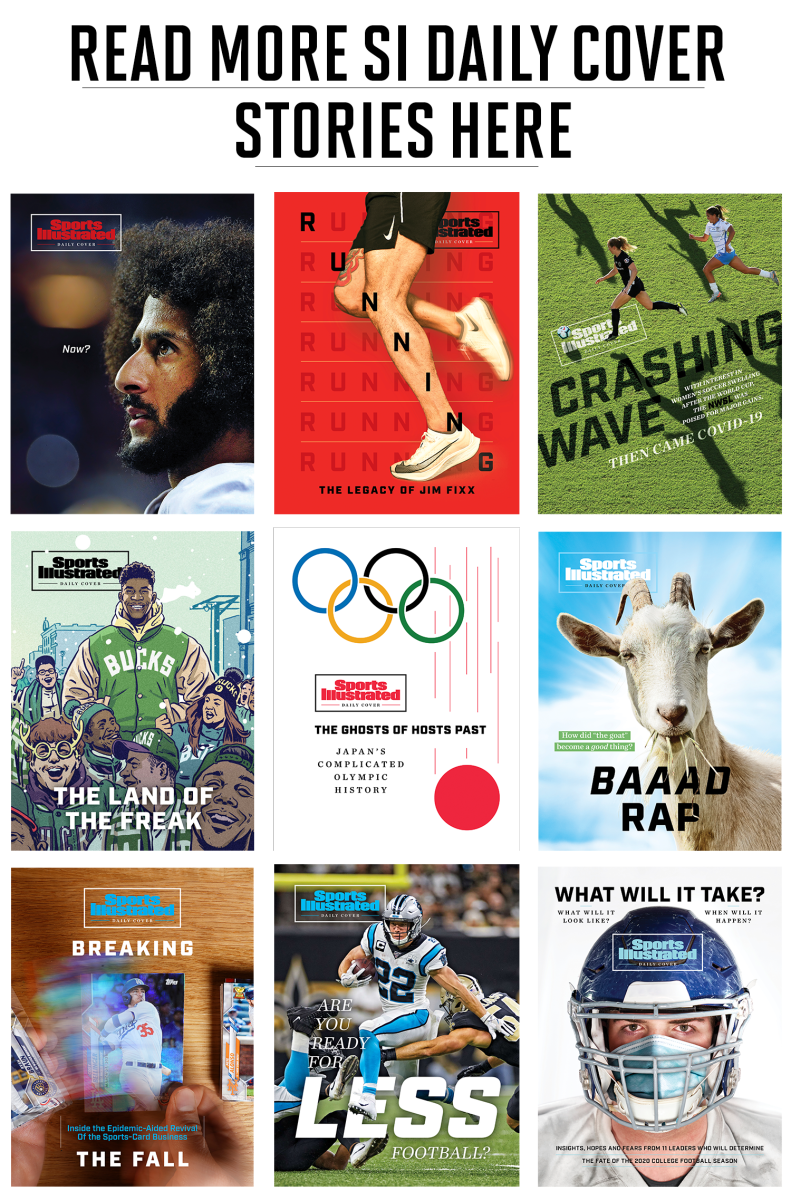
Spoelstra learned that lesson in the summer of 2019. He was on vacation with his wife, Nikki, in Europe and rerouted his trip so he could meet the Heat’s prized new acquisition face-to-face in Italy. The conversation shifted to travel, and Spoelstra mentioned to Butler how he had been promising to take Nikki on a wine tour of France.
“Of course Jimmy goes into a whole story about how much time he’s spent there, and how he’s friends with one of the more famous wineries there,” says Spoelstra. He sat sheepishly as Nikki got more envious with each detail. “My wife, I could just see the steam coming out of her ears.”
Spoelstra speaks in awed tones when describing Butler. He calls him a ferocious competitor who would have thrived in the rough-and-tumble NBA of the 1990s but is also happy biking around Amsterdam. Dragic, who said multiple times during the season that he had to calm Butler down because he wanted to fight someone, is acutely aware of his teammate’s soft side as well.
Dragic was in a dark place during the Finals. He had left the court after tearing the plantar fascia in his left foot in the first half of Game 1, and when he returned in Game 6 he was a shell of himself. After first learning of the severity of his injury Dragic locked himself in his hotel room.
“Jimmy always checked on me,” Dragic says. “After a few days he said, G, that’s enough. Let’s get out of your room, let’s hang out. He was telling me injuries are part of sports. It happens. He’s always such a positive guy. I’m really grateful for him.”
Dragic wasn’t Butler’s only responsibility. After averaging only 4.5 points through the first two games against L.A., Robinson was feeling he had let his team down. Around midnight the night before Game 3, Butler came pounding on Robinson’s door. For 20 minutes, Butler told Robinson not to lose his confidence, that his shooting would win his team a game. Then for the next hour they talked about everything except basketball. Robinson cleared his mind and averaged 16.5 points for the rest of the series, including a 26-point outburst in a Game 5 victory. “For him to show how much he really cared and valued my role on the team,” says Robinson, “it meant a lot.”
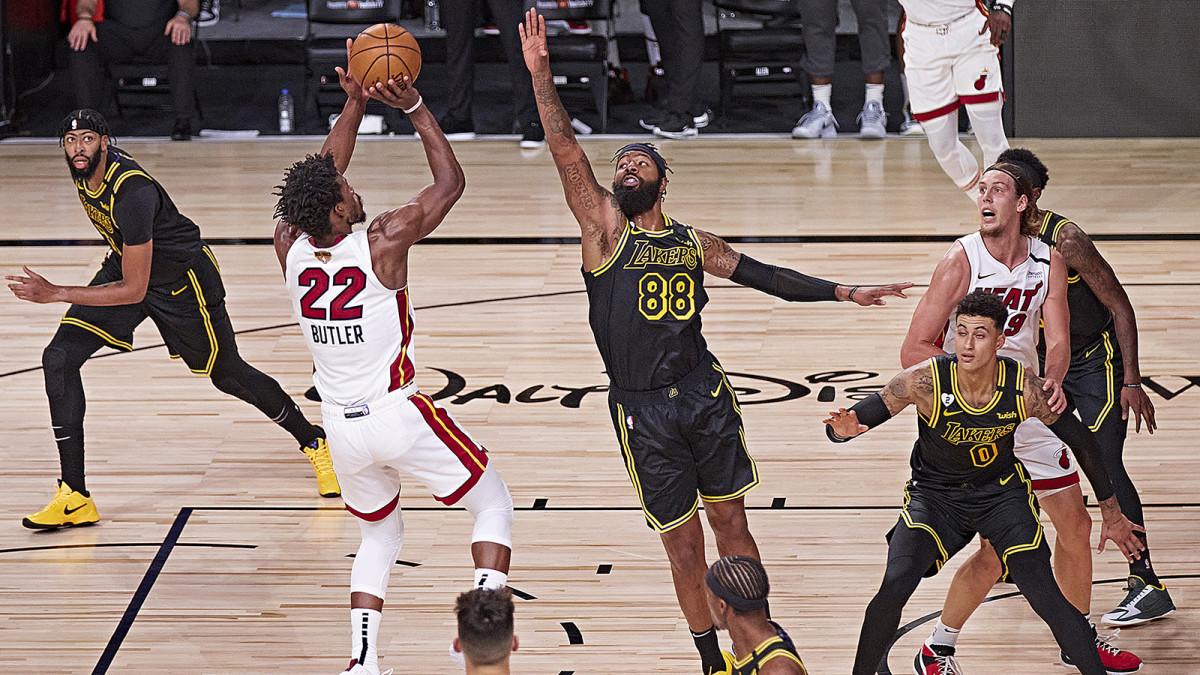
Butler was everything for the Heat during their Finals run. Scorer. Stopper. Jokester. Friend. Motivator. Butler says the biggest lesson he learned in the bubble was how much everyone on the team looked to him to set the standard. That only pushed him harder, until he was hunched over a railing along the baseline near the end of Game 5, having spent every ounce of energy. “That’s why we’re in this game, to push ourselves collectively to places you can’t imagine,” Spoelstra says. “Jimmy’s performance in the Finals was truly inspiring.”
“It was unbelievable,” says Dragic. “I don’t want to take nothing from LeBron, but Jimmy was guarding the best guy on the other team, and he was doing everything on offense for us. He was the best guy on the floor.”
“Look, I was legitimately exhausted,” Butler says. “But if I’m not exhausted, I can’t tell somebody else you’re not going hard enough. And I think that’s why my word holds a little bit of weight.”
Butler’s words also hold weight because he has made relationships in Miami that—from the outside—didn’t seem possible in his other stops. He considers Spoelstra a friend. He and Dragic are the NBA’s odd couple. And the younger players eagerly seek his mentorship. Spoelstra says he used to imagine what it would be like to coach Butler when he was an opponent. Butler also noticed from afar how hard Spo pushed players, or as he puts it, “I know when motherf------ are not bulls---ing.”
When he saw Butler eschew the postgame round of cards or celebratory dinner to watch more film in Chicago, Wade realized quickly how well Butler’s values aligned with Miami’s, and urged Riley to pursue him when Wade rejoined the Heat. “Jimmy told me he wanted to be remembered for his greatness,” Wade says. “The moment finally presented itself for him in the Finals. And he was ready.”
Conversations about Butler always seem to come back to how rigorously he prepares; his 4 a.m. workouts have almost become a cliché. But that’s not to say that Butler isn’t still putting in the time.
Even during this truncated offseason he pushed himself. His latest obsession is neurocognitive efficiency. Scott likes to run Butler through a drill in which he’s wearing 3-D glasses and staring at a set of 12 balls on a screen. Four balls are highlighted at the start, and then all of them will start moving around and bumping into each other. After a period of time, Butler has to identify which four balls were originally highlighted. If he picks all the right ones, the balls start moving faster for the next round. Scott will then gradually make the drill more difficult, making Butler stand on one leg or punch him with boxing gloves as he tracks the balls.
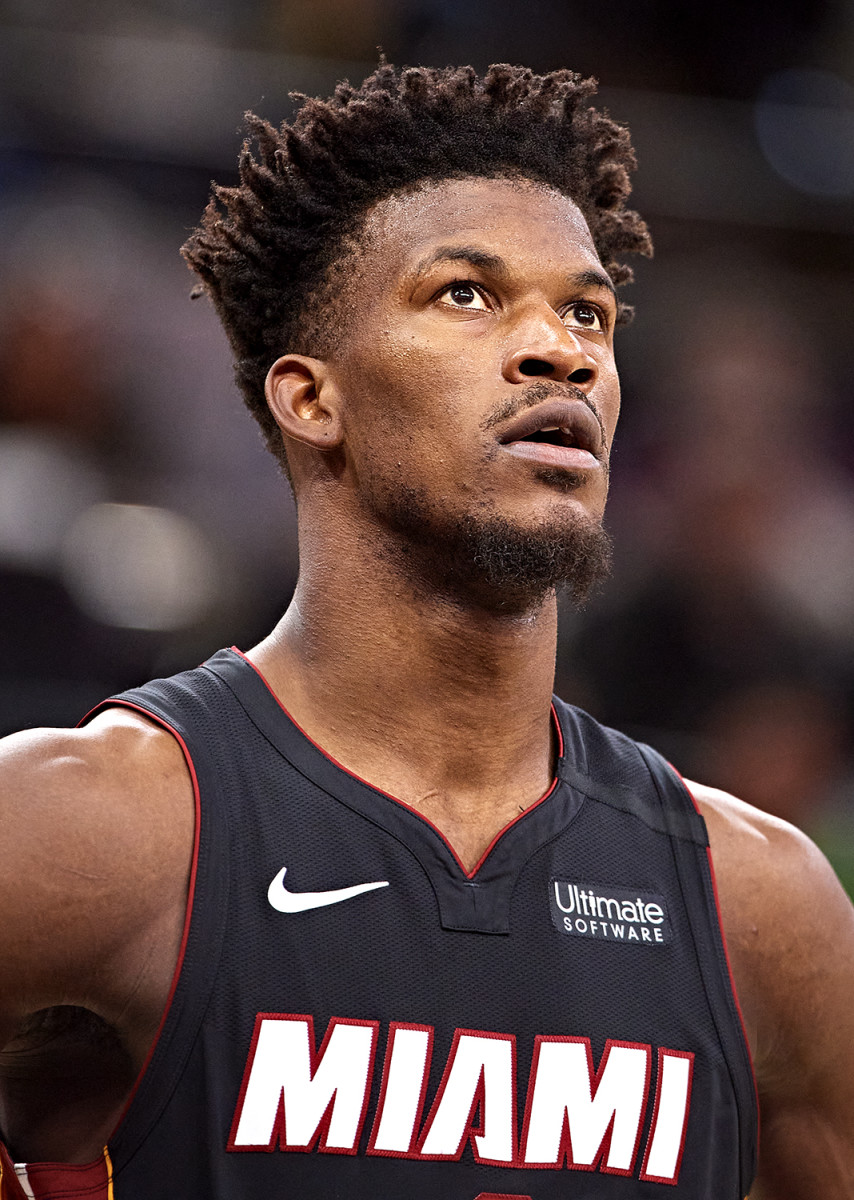
Butler has noticed all the comings and goings around the league. Miami mostly stood pat in the offseason, while the Lakers, Clippers and Bucks all added pieces, and Kevin Durant is set to return to the Nets. “I feel the same way I always feel: I’m betting on the Heat,” Butler says. “All the movement everybody’s doing? Don’t scare me none. We truly don’t care. What makes me smile, is every time we take the floor, the best player is on the Miami Heat.”
Butler’s bravado is hardly misplaced. At a T-Wolves practice two years ago, Butler—who had just requested a trade—infamously lined up with the third-teamers in a scrimmage and put on a dominant performance to prove his worth to management. In Game 3 of the 2020 Finals, Butler—with his two best teammates, Dragic and center Bam Adebayo, out with injuries—lined up with a 20-year-old rookie, an undrafted shooting guard, a journeyman forward and a 7-footer who’d gone from end of the bench to starter, and put up a historic 40-point triple double, leading Miami past a team headlined by two future
Hall of Famers.
“Just know, this year we finna win it, man,” Butler says. “I got something up my sleeve. I’m going to be better than ever. Just wait on it.”
Jimmy Butler has a way of getting what he wants.
